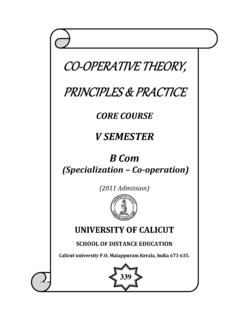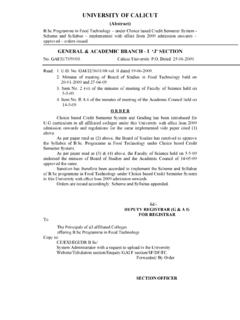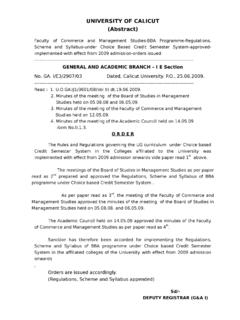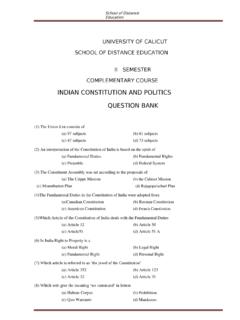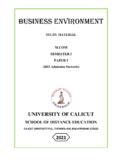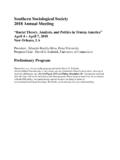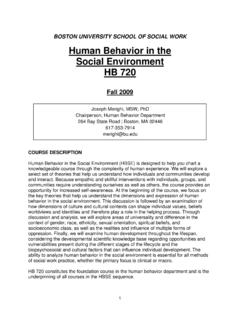Transcription of INTRODUCTION TO SOCIOLOGY - University of …
1 School of Distance EducationINTRODUCTION TO SOCIOLOGYCORE COURSE SOCIOLOGYII Semester(2011 ADMISSION ONWARDS) University OF CALICUTSCHOOL OF DISTANCE EDUCATIONC alicut University , Malappuram, Kerala, India-673 635 University OF CALICUTI ntroduction to SociologyPage 1277 School of Distance EducationSCHOOL OF DISTANCE EDUCATIONCORE COURSE - II SOCIOLOGYII SEMETERINTRODUCTION TO SOCIOLOGY Module I : Basics of SociologyPrepared by: Dr. Sara Neena. M. Associate Professor, Dept. of SOCIOLOGY , Vimala College, ThrissurModule II : SocialisationPrepared by: Sri.
2 Syed Abid Hussain Thangal, Associate Professor, Dept. of SOCIOLOGY , Farook College, III: Culture, Personality and SocietyPrepared by: Smt. Shilujas. M Lecturer, Dept. of SOCIOLOGY , Farook College, IV : Social ProcessPrepared by: Dr. Hafiz Muhammad Former Head of the Department, Department of SOCIOLOGY , Farook College, by: Dr. Hafiz Muhammad Former Head of the Department, Department of SOCIOLOGY , Farook College, Kozhikode. Layout & Settings.
3 Computer Section, SDE ReservedIntroduction to SociologyPage 2 School of Distance Education CONTENTSPAGES MODULE - I05 - 23 MODUL - II24 - 33 MODULE - III34 - 40 MODULE - IV 41 - 49 INTRODUCTION to SociologyPage 3 School of Distance Education MODULE 1 BASICS OF SOCIOLOGYI ntroduction to SociologyPage 4 School of Distance EducationOrigin, meaning ,definition and nature of sociologyStudying society can hardly be claimed to be anything new; as far back as we have records, scholars and scribes have described and analyzed the social life shared by a people.
4 Yet SOCIOLOGY as a discipline goes back in name and identity only to the early decades of the nineteenth century. SOCIOLOGY grew at a time of new and creative social thought that transformed and modernized all of the social sciences. New specialized disciplines broke away from the long-established fields of history and French Revolution, which began in 1789, symbolized this dramatic break with political and social tradition. French social analyst Alexis de Tocqueville (1805-1895) declared that the changes in society brought about by the French revolution amounted to nothing short of the regeneration of the whole human race.
5 Huge factories, exploding cities, and a new spirit of individualism- these changes combined to make people aware of their surroundings. As the social ground trembled under people s feet, the new discipline of SOCIOLOGY was born in England. France and Germany-precisely where the changes were greatest. The discipline of SOCIOLOGY emerged in response to the vast social upheaval which so radically changed the shape of society in Europe; the French Revolution, for one which marked the rise to political power of new middle classes, instead of aristocrats and kings, the Industrial Revolution, for another, which, together with capitalism, brought about industrial society.
6 The origins of these changes, just after the French Revolution, that thoughtful people began to realize just how revolutionary they were. Once under way the revolutionary transformation of society relentlessly altered the way everyone was to live. Two significant consequences followed from ) People s daily range of personal experience became too limited in scope to provide them with sufficient familiarity with their own social world, for that world was growing to be vast and ) Their world changed before their eyes even as they learned about it.
7 People soon learned that they could not assume that their world would be the same as the world of their parents, or that the world of their children would be like their own. For many social thinkers the radical transformation of society produced born hope and anxiety. Political democracy and using standards of living were sources of hope. Yet there also emerged a deep anxiety over the future. Scholars recognized that an old order was gone, replaced by a new order of unfamiliar and uncertain features.
8 Among a varied group of intellectuals in nineteenth century Europe, there developed a new consciousness about society, a recognition of how revolutionary has been the change in human society, how uncertain had the future become .From such concerns as those, SOCIOLOGY was born. SOCIOLOGY has attempted to provide answers to questions generated about the old and new forms of society. The origin of SOCIOLOGY , then, is rooted equally in two different though related tasks. The formulation of a theory of industrial society, and observation and description of the lives of people in new, urbanized environments.
9 If SOCIOLOGY emerged as a distinct social science from INTRODUCTION to SociologyPage 5 School of Distance Educationthis process, many others besides sociologists engaged in the task. Auguste Comte (1798-1857), who is known as the father of SOCIOLOGY , recognized the absence of a general science that deals with society as a whole. Comte combined two terms Socius , Latin for society , and logos , Greek for studying and coined SOCIOLOGY which literally means study of society Comte defined SOCIOLOGY as the abstract and theoretical science of social phenomena subject to natural and invariable laws, the discovery of which is the object of investigation.
10 Comte was startled by the destructive effect of the French revolution which, he believed, undermined the moral fabric of the community. He wanted to establish a new social order based on what he perceived to be the moral community. The task of recreating a new social order required a new scientific discipline with objective laws. Thus was born SOCIOLOGY as a science of society. Today sociologists are more apt to define SOCIOLOGY as the scientific study of society, its institutions, structures and processes.
